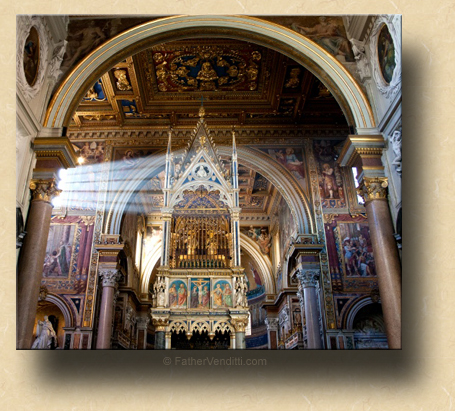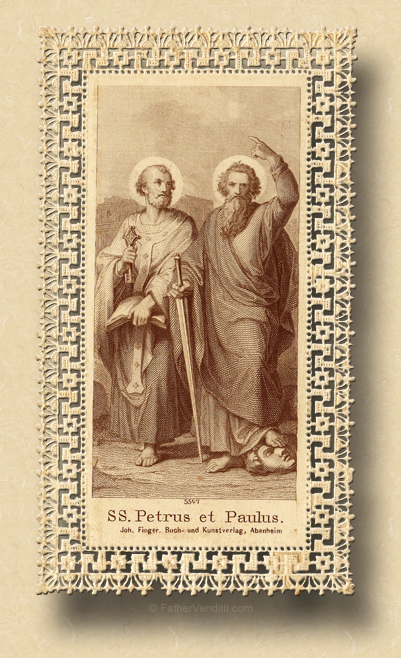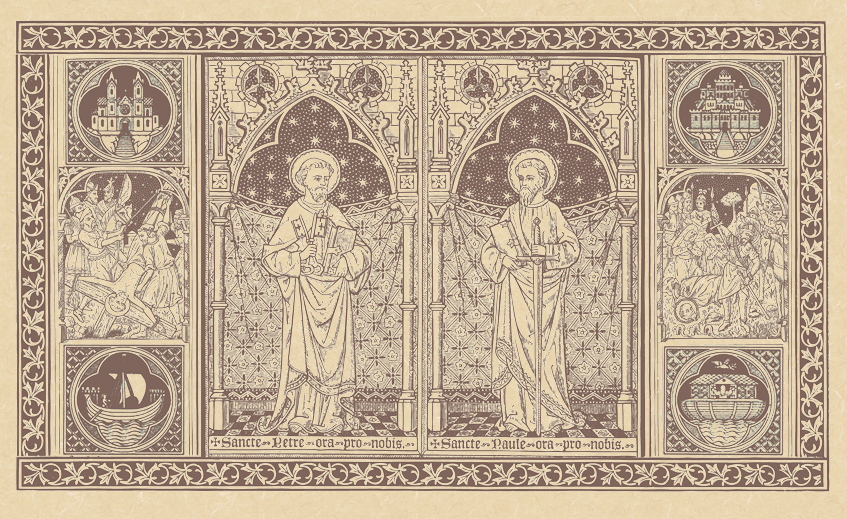For Every Action There Is an Equal and Opposite Reaction.
The Solemnity of Saints Peter & Paul, Apostles.
Lessons from the proper, according to the ordinary form of the Roman Rite, for the vigil:
• Acts 3: 1-10.
• Psalm 19: 2-5.
• Galatians 1: 11-20.
• John 21: 15-19.
…and for the feast:
• Acts 12: 1-11.
• Psalm 34: 2-9.
• II Timothy 4: 6-8, 17-18.
• Matthew 16: 13-19.
The First Class Feast of Saints Peter & Paul, Apostles.
Lessons from the proper, according to the extraordinary form of the Roman Rite:*
• Acts 12: 1-11.
• Psalm 44: 17-18.
• Matthew 16: 13-19.
The Solemn Holy Day of the Holy, Glorious & Illustrious Pre-Eminent Apostles, Peter & Paul.
Lessons from the menaion, according to the Ruthenian recension of the Byzantine Rite:
• II Corinthians 11: 21—12: 9.
• Matthew 16: 13-19.
FatherVenditti.com
|
 8:52 AM 6/29/2016 — Peter and Paul are linked together in this feast because they are linked together in the foundation of the Catholic Church. Peter, the head of the Apostles and appointed by Christ to be his vicar on earth, founded the Church in Rome and died a martyr's death there. Paul, the Church's first and greatest missionary, also died a martyr in Rome. Years ago, when I made my first visit to the Eternal City of Rome back in the early 1980s, I was praying one day in the Basilica of St. John Lateran—the cathedral church of the Diocese of Rome and the cathedral church of our Holy Father the Pope—and I was approached by a young American tourist, a Protestant, who obviously thought I belonged there, and who began to ask me questions about the Basilica; so, I pointed out to him what I thought was the most significant point about the Basilica: that the baldacchino over the high altar is actually a reliquary which contains the heads of the Blessed Apostles Peter and Paul. A look of astonishment came over his face, and he said, “You mean our Peter and Paul?” By that he meant, “You mean the same Peter and Paul written about in my Protestant Bible?” I didn't volunteer any more information after that. Had I gone on to suggest that he walk over to St. Mary Major and pray before the manger in which the Child Jesus was lain in Bethlehem, he would have had a stoke. 8:52 AM 6/29/2016 — Peter and Paul are linked together in this feast because they are linked together in the foundation of the Catholic Church. Peter, the head of the Apostles and appointed by Christ to be his vicar on earth, founded the Church in Rome and died a martyr's death there. Paul, the Church's first and greatest missionary, also died a martyr in Rome. Years ago, when I made my first visit to the Eternal City of Rome back in the early 1980s, I was praying one day in the Basilica of St. John Lateran—the cathedral church of the Diocese of Rome and the cathedral church of our Holy Father the Pope—and I was approached by a young American tourist, a Protestant, who obviously thought I belonged there, and who began to ask me questions about the Basilica; so, I pointed out to him what I thought was the most significant point about the Basilica: that the baldacchino over the high altar is actually a reliquary which contains the heads of the Blessed Apostles Peter and Paul. A look of astonishment came over his face, and he said, “You mean our Peter and Paul?” By that he meant, “You mean the same Peter and Paul written about in my Protestant Bible?” I didn't volunteer any more information after that. Had I gone on to suggest that he walk over to St. Mary Major and pray before the manger in which the Child Jesus was lain in Bethlehem, he would have had a stoke.
When our Blessed Lord established the Church upon the Rock of the Prince of the Apostles, he did so because He knew that, even though His Church would be of Divine origin, it would still have to be a human institution; and, human institutions are, by their very nature, plagued by human frailty. This is part of the mystery of the Incarnation: Jesus is the God who became a Man; and, His Church, though founded by God, would have to be entrusted to men, with all their sins and all their faults and all the frailties that are the result of their free wills rubbing up against their fallen nature. As the Church spread out from Rome to all the known world, her human frailties would become manifest in the many heresies and scandals that plagued her in those early years; and, her Divine origins would become manifest in those sins being washed clean by the blood of countless martyrs who died fighting those heresies and scandals during the persecutions that attempted to destroy her.
A striking example of this is found in the second Apostolic reading of today's Mass, taken from the Blessed Apostle Paul's Second Epistle to Timothy. Timothy was a close friend of Paul's who had traveled with the Apostle on his first missionary journey and had even been arrested with him, so they were old cell mates.  When Paul established the Church in Ephesus, he made Timothy the bishop there; but, Timothy was very young, perhaps too young to have been made a bishop, and the people there rejected him; so, Paul wrote this letter to encourage him. It's Paul's last letter; in fact, he's under arrest again when he writes it. He writes it in transit as he's being taken to Rome to be tried for treason, so he knows that he will soon be dead, and the subject of his own eternal judgment is on his mind. His advice to Timothy is practical enough, encouraging him to plod along with his priestly duties and embrace his suffering as participation in Christ's, but it causes him to reflect on his own imminent death, and these are the reflections which are prescient for us as we celebrate the feast of the Apostles. I give you Msgr. Knox's translation because it is so clear and expressive: When Paul established the Church in Ephesus, he made Timothy the bishop there; but, Timothy was very young, perhaps too young to have been made a bishop, and the people there rejected him; so, Paul wrote this letter to encourage him. It's Paul's last letter; in fact, he's under arrest again when he writes it. He writes it in transit as he's being taken to Rome to be tried for treason, so he knows that he will soon be dead, and the subject of his own eternal judgment is on his mind. His advice to Timothy is practical enough, encouraging him to plod along with his priestly duties and embrace his suffering as participation in Christ's, but it causes him to reflect on his own imminent death, and these are the reflections which are prescient for us as we celebrate the feast of the Apostles. I give you Msgr. Knox's translation because it is so clear and expressive:
It is for thee to be on the watch, to accept every hardship, to employ thyself in preaching the gospel, and perform every duty of thy office, keeping a sober mind. As for me, my blood already flows in sacrifice; the time has nearly come when I can go free. I have fought the good fight; I have finished the race; I have redeemed my pledge; I look forward to the prize that is waiting for me, the prize I have earned. The Lord, the judge whose award never goes amiss, will grant it to me when that day comes; to me, yes, and all those who have learned to welcome his appearing (II Tim. 4: 5-8 Knox).
In almost every way imaginable, the feast of the Blessed Apostles Peter and Paul is a feast about the Catholic Church. But when we think about the Church, our emotions are mixed. We love our Church—that's why we're here—but there isn't a piece of news on television about the Catholic Church that isn't about some sort of scandal or crisis; and, we are often tempted to think that things couldn't possibly be worse. That's because our own historical perspective begins on the day we are born; we don't reflect back beyond that point; but, things were, at one point, much worse. They were worse when the Church's first Pope was crucified in Rome; they were worse when the Church's first and greatest missionary Apostle was beheaded in the same city; they were worse when Christians by the thousands were crucified, burned, beheaded or killed for sport in the arena for nothing more than proclaiming the Holy Name of Jesus Christ.
Yes, the human element of the Church has suffered its share of sins: she suffered sin in the first century when judaising Christians from Jerusalem followed the Apostle Paul from city to city undoing all his conversions, and telling his converts that they had to be circumcised and become Jews before they could become Christians; she suffered sin in the third and fourth centuries when Christians who had reverted to paganism to avoid the persecutions came back afterward demanding that they be readmitted to the Church without having to do any penance; she suffered sin in the eleventh century when, in the name of the inquisition, she tried to force people against their will to embrace the faith in insincere conversions. There hasn't been a period in the history of the Church where their hasn't been some sort of sin, where the human men to whom our Lord entrusted her haven't manifested their human faults and their fallen nature. But there also hasn't been a time when the Church's sins haven't been wiped clean by the blood of those who remained faithful to the point of death. And even today, when it seems that every news broadcast presents some new scandal to feed fuel to the caldrons of the Church's enemies on earth, the blood of martyrs washes her clean again: in Vietnam, in China, in Syria, in Iraq and all through the Middle East, where every day Catholics are driven from their homes, their churches burned, they and their priests are murdered. We don't hear about these things because the secular media doesn't consider them news; but, we don't need to know about them. These martyrdoms are significant not because we know about them, but because they wash the Church clean again.
The Introit for today's Mass on the Solemnity of the Apostles Peter and Paul: Isti sunt qui, vivéntes in carne, plantavérunt Ecclésiam sánguine suo: cálicem Dómini bibérunt, et amíci Dei facti sunt—“These are the ones who, living in the flesh, planted the Church with their blood; they drank the chalice of the Lord, and became the friends of God.” Let us, on this most holy feast, ask for their prayers for ourselves, and for the Church that our Lord and God Jesus Christ personally established upon this earth.

* For the lessons for the Second Class Vigil of the Blessed Apostles Peter & Paul, cf. yesterday's post.
|

